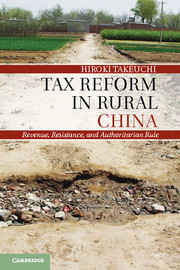Description
Tax Reform in Rural China
Revenue, Resistance, and Authoritarian Rule
Author: Takeuchi Hiroki
This book answers the important question - how does China maintain authoritarian rule while it is committed to market-oriented economic reforms?
Language: English
Subject for Tax Reform in Rural China:
Approximative price 107.80 €
In Print (Delivery period: 14 days).
Add to cart
Publication date: 08-2014
253 p. · 15.6x23.5 cm · Hardback
253 p. · 15.6x23.5 cm · Hardback
Description
/li>Contents
/li>Biography
/li>
How does China maintain authoritarian rule while it is committed to market-oriented economic reforms? This book analyzes this puzzle by offering a systematic analysis of the central-local governmental relationship in rural China, focusing on rural taxation and political participation. Drawing on in-depth interviews with Chinese local officials and villagers, and combining them with game-theoretic analyses, it argues that the central government uses local governments as a target of blame for the problems that the central government has actually created. The most recent rural tax reforms, which began in 2000, were a conscious trade-off between fiscal crises and rural instability. For the central government, local fiscal crises and the lack of public goods in agricultural areas were less serious concerns than the heavy financial burdens imposed on farmers and the rural unrest that the predatory extractive behavior of local governments had generated in the 1990s, which threatened both economic reforms and authoritarian rule.
Introduction; 1. The theory of revenue and resistance under authoritarian rule in rural China; Part I. Historical and Analytical Contexts: 2. Revenue and resistance in rural China in history; 3. Revenue and resistance under authoritarian rule in post-Mao rural China, 1980–2005; 4. Survival strategies of local governments: from predatory taxation to land trade; Part II. Analytic Narratives: 5. Exit strategies of villagers: migration and taxation in rural China; Appendix 5A: formal description and solution to the game of migration and taxation; 6. Voice strategies of villagers: petitions and taxation in rural China; Appendix 6A: formal description and solution to the game of migration, participation, and taxation; 7. Village elections and authoritarian rule in rural China; Appendix 7A: formal description and solution to the village election game; Conclusion; Appendix of empirical sources and methods: Appendix A: list of informants; Appendix B: interview questions; Appendix C: sources of the cases on village elections.
Hiroki Takeuchi is Associate Professor of Political Science and Fellow of the John Goodwin Tower Center for Political Studies at Southern Methodist University. He previously taught at the University of California, Los Angeles, as faculty Fellow in the political science department and at Stanford University as postdoctoral teaching Fellow in the public policy program. He received his PhD in political science from UCLA, specializing in comparative politics and international relations. His research focuses on Chinese and Japanese politics, comparative political economy of authoritarian regimes, and political economy and international relations in East Asia, as well as game theory applications to political science. His recent articles have been published in the Journal of Contemporary China, the Journal of Chinese Political Science, the Japanese Journal of Political Science, the Journal of East Asian Studies, International Relations of the Asia-Pacific, and Modern China.
© 2024 LAVOISIER S.A.S.




